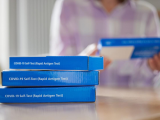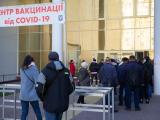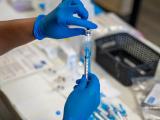Two new polls offer a glimpse into how Americans are thinking about the COVID-19 pandemic as the Omicron surge continues to recede across the country, as new data from the Centers for Disease Control and Prevention (CDC) demonstrate moderate vaccine protection in young children against serious COVID illness.
Just 24% of Americans say they are "extremely" or "very" worried about themselves or a family member getting COVID, according to a new Associated Press-NORC Center for Public Affairs Research Poll. That's down from 36% in December and January.
Another 34% of poll participants said they are somewhat worried about the virus.
In a Washington Post-ABC News poll, 49% of Americans say the pandemic is only somewhat under control, and 15% say it is not at all under control. Fifty-six percent of respondents say they have fully or partly returned to pre-coronavirus life.
Thirty-four percent of those polled said they regard the pandemic as largely controlled, which is the highest proportion for that response since surveys began tracking attitudes about the pandemic, the Post said.
Sixty percent of Americans said they expect and welcome some restrictions on daily life, while 40% said no restrictions are needed at this point.
Vaccine, booster protection in kids
On the heels of data from New York state that show the Pfizer/BioNTech COVID-19 vaccine performed poorly in preventing illness in children ages 5 to 11, the CDC today published new data that show two-dose protection of the vaccine against emergency department (ED) and urgent care (UC) visit among 5- to 11-year-olds was 46% 14 to 67 days after the second dose.
The study also found that booster vaccine doses helped prevent illness during the Omicron surge by restoring vaccine effectiveness [VE] to 81% among adolescents aged 16 and17 years.
Two-dose VE among adolescents aged 12 to 15 and 16 to 17 years waned significantly: VE 14 to 149 days after dose 2 was 83% and 76%, respectively; VE more than 150 days after dose 2 was 38% and 46%, respectively.
Though VE waned, protection against COVID-19–associated hospitalization was 73% to 94% for adolescents who received two doses of vaccine. The
"This report provides real-world evidence of protection by the Pfizer-BioNTech vaccine against COVID-19–associated ED and UC encounters and hospitalizations among children and adolescents aged 5–17 years," the authors concluded. "All eligible children and adolescents should remain up to date with recommended COVID-19 vaccinations, including a booster dose for those aged 12–17 years."
In a second CDC study, researchers show a third dose of the Pfizer vaccine produces few adverse reactions among receipts ages 12 to 17.
Most notably, the reporting rate of confirmed cases of myocarditis among adolescent boys after a Pfizer booster dose (11.4 per 1 million doses administered) was lower than for two-dose vaccination for boys aged 12 to 15 years (70.7 per 1 million doses administered), the authors said.
In related news, nearly 127,000 child COVID-19 cases were reported for the week ending Feb 24, according to the latest update from the American Academy of Pediatrics (AAP)
That number is "down substantially from the peak level of 1,150,000 reported the week ending January 20th and lowest weekly count since mid-November," the AAP said.
West Coast states lift school mask mandates
California, Oregon, and Washington will end their statewide mask mandates for schools and other indoor settings by Mar 12, the governors of all three states announced yesterday, the Wall Street Journal reports.
The move comes one day after New York announced the end to its mandates for schoolchildren beginning Mar 7. All three states will also lift indoor mask requirements for the vaccinated and unvaccinated by Mar 12.
The United States reported 105,840 new COVID-19 cases yesterday and 2,093 deaths, according to the Johns Hopkins COVID-19 tracker.
New estimates compiled by the CDC show that more than 140 million Americans have had the coronavirus, about double the rate regularly cited by national case counts, the Washington Post reports.
Hong Kong, New Zealand grapple with surges
Meanwhile, Hong Kong today, in the midst of its Omicron surge, reported 32,597 new cases, according to the Centre for Health Protection (CHP).
Though officials say a lockdown isn't planned, the local media says people will be urged to stay home during compulsory testing of the area's 7.4 million residents. The mass testing is slated to take place after the surge is expected to peak in the middle of March.
In a statement yesterday, Hong Kong leader Carrie Lam said the surge has grown from 100 cases a day at the beginning of February to a level that has outgrown the capacity to respond. Mainland officials have built a 3,900-room isolation facility.
Lam said deaths in the current wave are double the number reported over the last 2 years. "The situation is worrying and heartbreaking," she said.
Elsewhere, New Zealand's surge continues to intensify, with nearly 20,000 cases reported today, with Auckland making up more than half of cases. The pace of the outbreak is stretching lab capacity, and officials are transitioning some polymerase chain reaction (PCR) testing to rapid testing.
Officials said high vaccination levels mean most illnesses will be mild, and so far there are no reports of overburdened health systems. Currently, 373 people are hospitalized for COVID-19, with 9 people in intensive care units.
CIDRAP News Editor Lisa Schnirring contributed to this story.






















